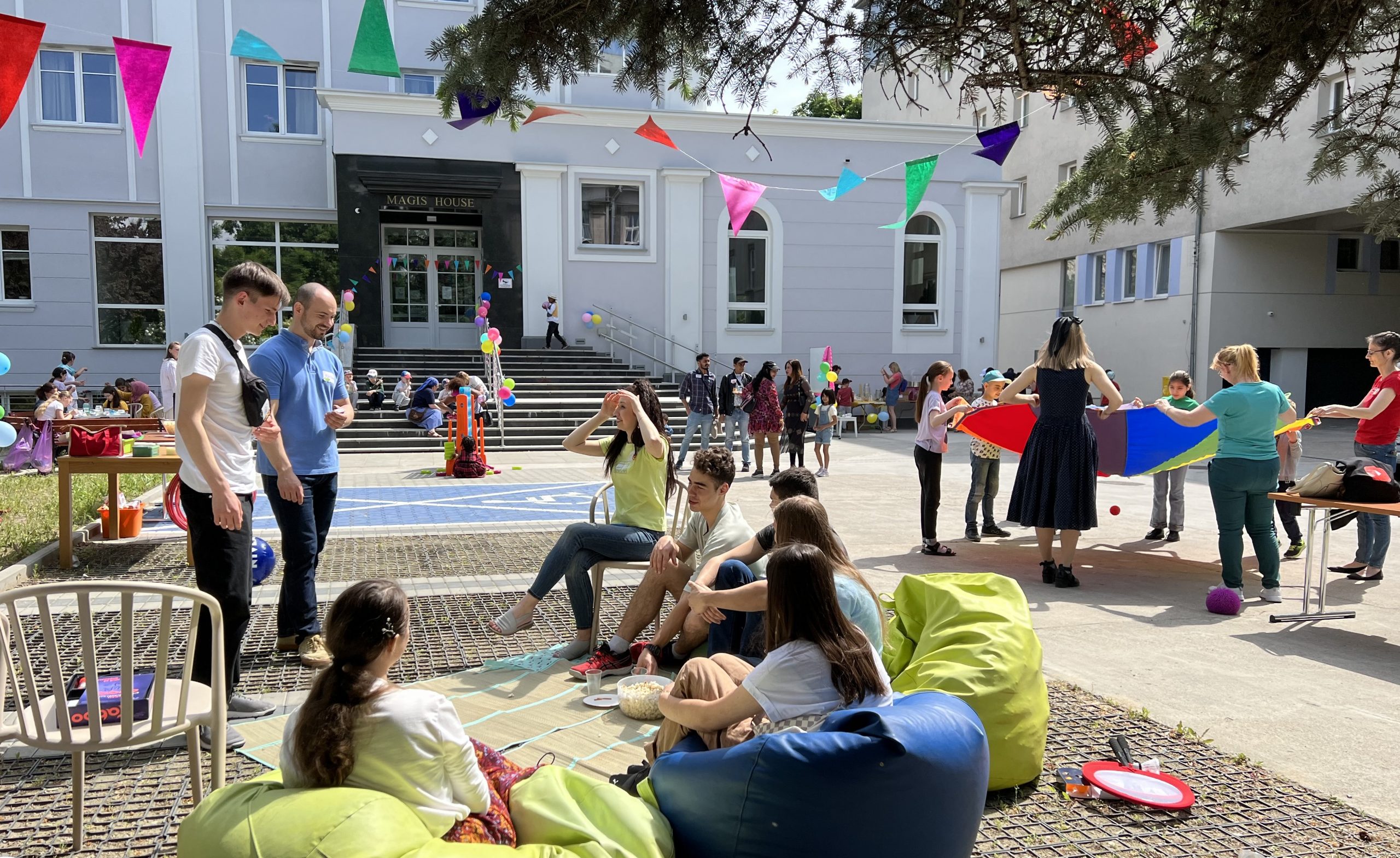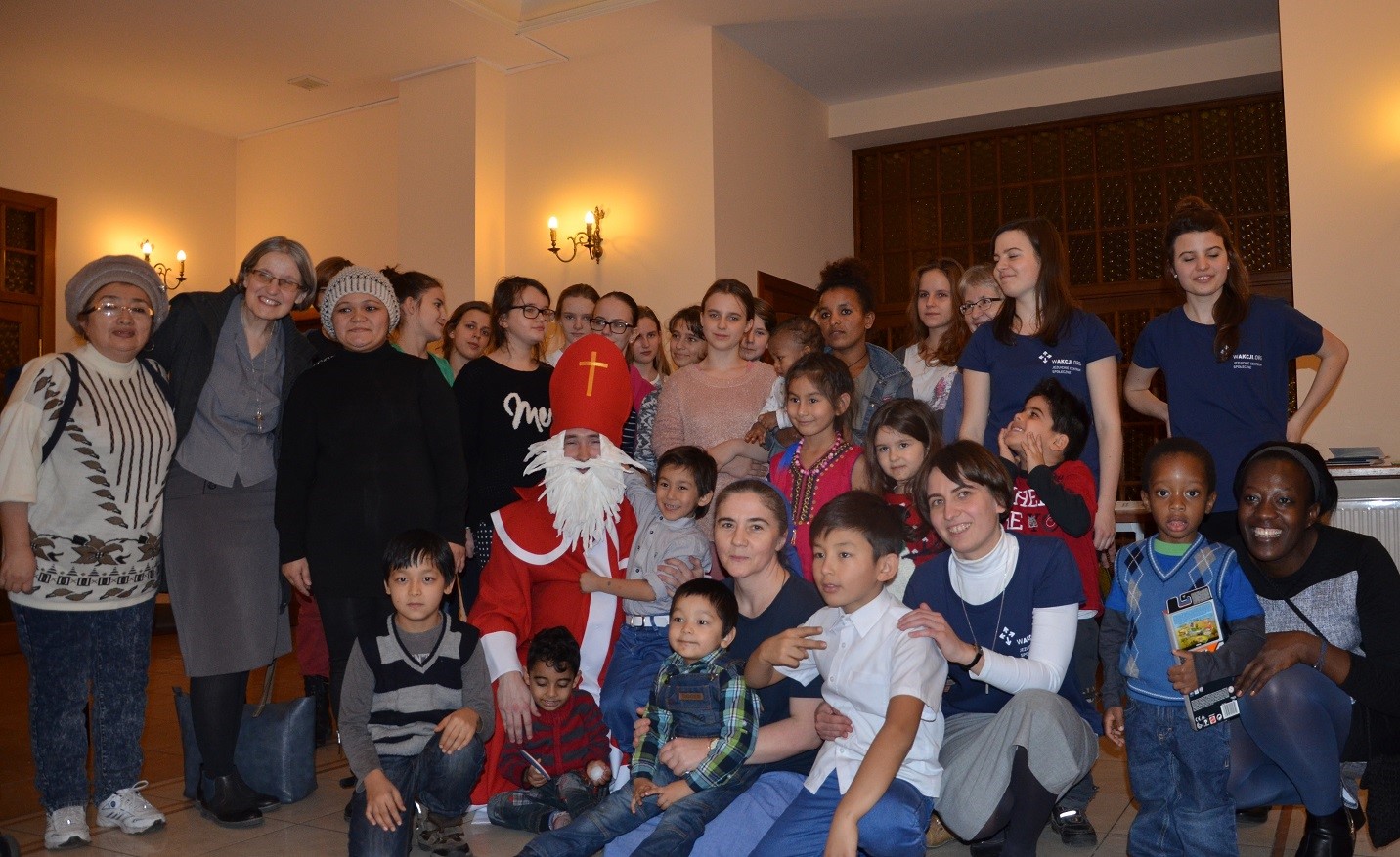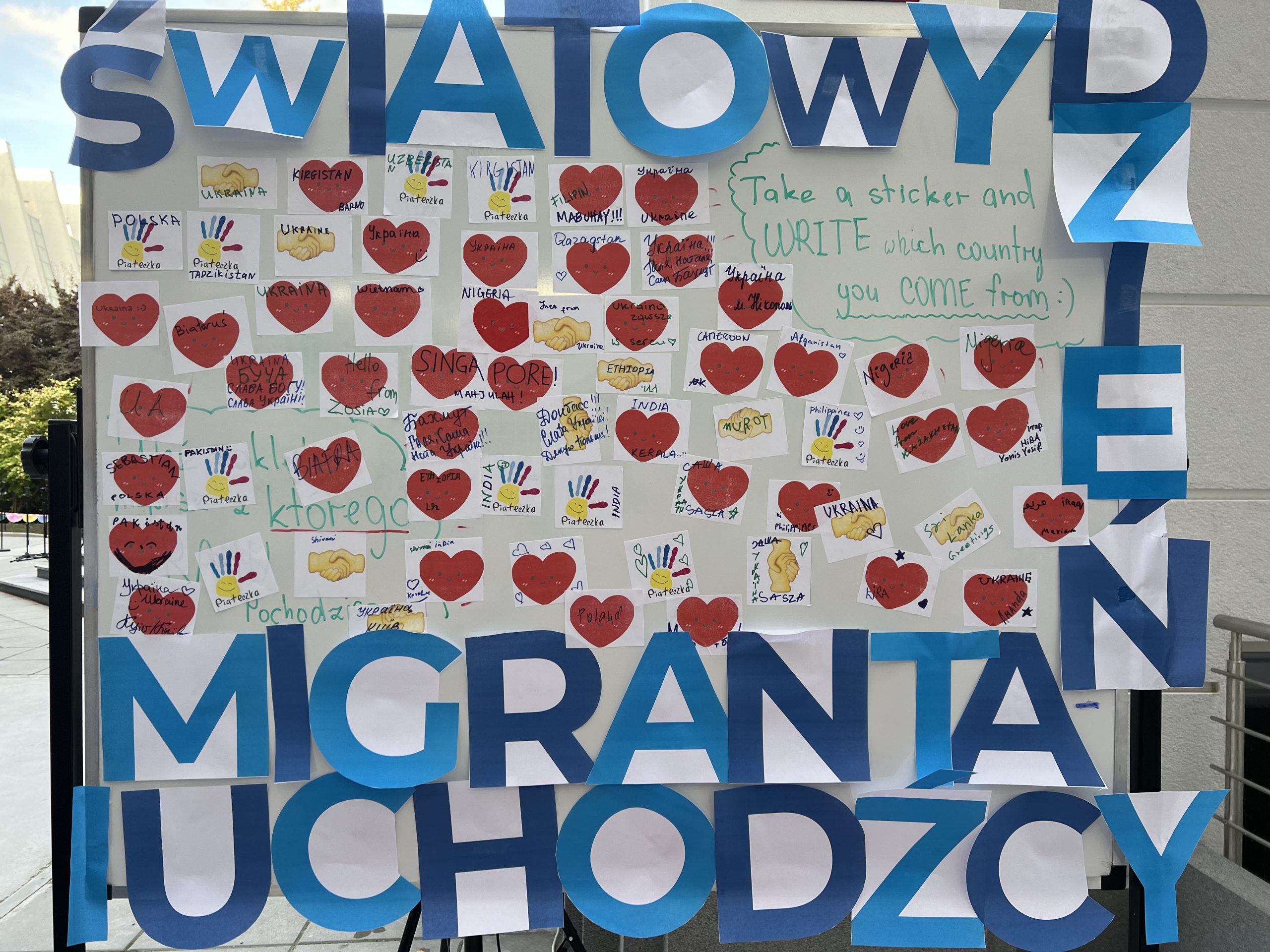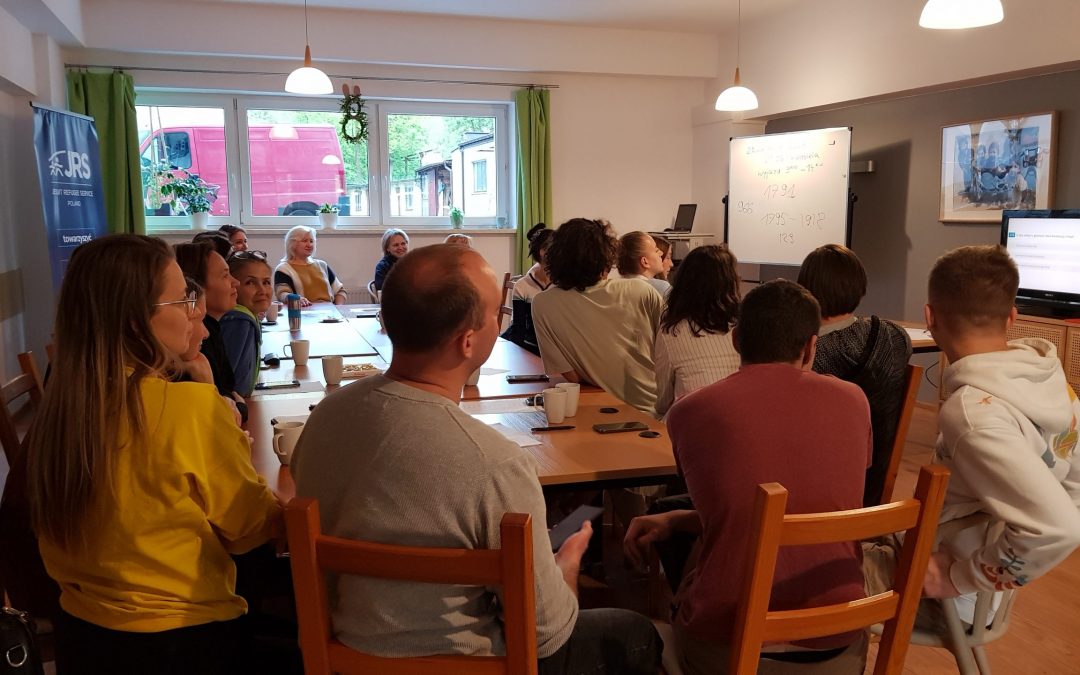“The very idea came from the fact that the refugees who appeared in Poland, Africans, spoke French and found out, I don’t know how, that I was a French-speaking person. They showed up, systematically started coming, and discovered their home here. They felt safe here.”
FR GREGORY BOCHENEK, Managing Director of JRS Poland
The rhythm carried throughout the courtyard. That day was windless, and only a dance of a few hundred feet set the autumn leaves in motion. The unique blaze of colors was not a harbinger of the change of seasons though, which had to give way to the colors of the world’s folklore. The Festival of Many Cultures was underway – a celebration of various customs and traditions in the common space at the Jesuit College in Warsaw.
“The very idea came from the fact that the refugees who appeared in Poland, Africans, spoke French and found out, I don’t know how, that I was a French-speaking person. They showed up, systematically started coming, and discovered their home here. They felt safe here.” Fr Gregory Bochenek is the first chapter of this story, although he insists it was Rwandan people. The need came from outside, but his initiative twelve years ago gave rise to the Jesuit Social Centre (JCS), then present at 21 Narbutta Street, in the Warsaw Curia of the Society of Jesus.
At that time, in 2012, the topic of refugees in Poland was practically non-existent. Fr Gregory says, “Our activities were considered innovative, especially within the Catholic Church.” Refugees were not seen daily, the media did not write about them, and they were not shown on television. Would anyone voluntarily choose Poland as their new home? In the face of so many warmer, seemingly better-situated countries with more easily assimilated languages, this sounded like an original idea, to say the least. However, time showed the opposite trend – forced migration was gaining momentum. Word of the place “on Narbutta” was spreading, intensely increasing the number of refugees appearing in Jesuit spaces, and its secretive founder was watching it become a permanent, intercultural, and supra-religious community.
Fr Grzegorz Bochenek together with Rwandan people, Narbutta 21, Warsaw, 2012
“It’s autumn, October 2013. I am at an evening Mass at Our Lady of Grace (in the Jesuit sanctuary in Warsaw’s Old Town; author’s note); a nice and handsome boy is standing behind me, and I thought I knew that face. After Mass, someone called me: “Sister, Sister!” It turned out to be Rafał Bulowski, a scholastic at the time, who asked if I was looking for a job because the Provincial sent him to lead the JCS to work with refugees. It was a group from Rwanda who knocked on the Warsaw Curia on Narbutta. This group sought a French-speaking priest to celebrate Mass and administer the sacraments. And Fr Gregory knew French well.” Sister Agata, from The Congregation of the Little Sisters of Jesus, is also fluent in French, although this is certainly not the main reason why she originally came to the JCS (now JRS) and why she still works there today.
If we call someone the soul of this place, the person weaving bonds and nurturing relationships, it is Sister Agata. As she recalls, “The greatest bane of those who came was the lack of knowledge of the Polish language” which made it impossible to function in our country, especially in those years. Therefore, the natural response of the Centre at Narbutta was to organize language courses, which were run by volunteers and remain the flagship activity of the JRS to this day. However, from the beginning, she says, the most important thing was the community – existing on its own and growing by word of mouth, without banners or advertisements, media or broadcasting, gathering in the basement converted into an open-door center and simply spending time together. Learning the language was only an educational prelude to the complex integration process, which was initiated by it and developed in various forms over the next seven years of the JCS work.
S. Agata msj (down right corner) and Fr Rafał Bulowski (top left corner) at summer camp with children, Jelenia Góra, 2015
“When I came to JCS (in the autumn of 2021; author’s note), it was a time of rebirth. With the then director, Fr Łukasz Lewicki, we were slowly taking various initiatives, and in-person courses were returning. On 24 February 2022, we hosted our first event – the Fat Thursday celebration. What a great choice of date! Recounting what happened afterwards is not easy. The whole country participated in it. We tried various things – on the third day of war we were helping a bus full of non-Ukrainian refugees from Ukraine, then we took people in, looked for housing, ran a reception point at the border together with Caritas, rescued people in various extreme situations, started intensive language courses, ran a prayer and online support groups. What I mainly remember from that time was the chaos: there were a lot of ideas and everything was done intuitively. Navigating through uncertainty with a mix of intuition and prayer”. Sister Ursula Krajewska, from the Society of the Sacred Heart of Jesus, started working at JCS a few months before the outbreak of war in Ukraine. At that time, as the world was trying to return to normality after a pandemic that lasted for two years, her undoubted organizational skills and discipline allowed the Foundation’s activities to be gradually reorganized.
Before 2020, the JCS headquarters moved from the Curia building at Narbutta to the grounds of the Andrzej Bobola Sanctuary at 61 Rakowiecka Street in Warsaw. During the pandemic years, the Foundation’s activities were carried out online, and it was only possible to return to a vibrant, open space at the beginning of 2022. Quite symbolically, the new JCS/JRS office is also an adapted basement, giving back a bit of the character of the original premises, despite its much larger and visibly renovated space. As Sister Ursula points out, more and more is happening here. This is thanks to a larger team and many more volunteers – indeed, at the beginning of 2024, a dozen people were already working at JRS Poland. She also emphasizes how important it is that JCS has become part of the global Jesuit Refugee Service Foundation – it has given a sense of stability and security to the activities carried out in Poland. “We can give constant support, and at the same time, we have not lost what has always been important” she adds, talking about being close to people, having one-to-one contact, and creating an international community existing above all divisions.
S. Urszula Krajewska rscj (in white) during dances celebrating Easter, Rakowiecka 61, Warsaw, 2023
Jesuit Refugee Service Poland – JRS – is a foundation that has supported over two thousand migrants and refugees in its first year. It is a place where hundreds of people have also become permanently associated over the ten years of its activities as the Jesuit Social Centre. Above all, JRS is about being with others, accompanying them with conversation and listening. It is about giving an intercultural space in which everyone strives to recognize other people’s needs and support them in achieving them. Polish courses, a youth club, a language conversation club, legal and psychological support, and events that bring everyone together to celebrate various holidays and occasions, are the basis of the Foundation’s efforts to support and integrate migrants into the Polish community and to create relationships that help them find their way in our – and their new – country. The enduring aim of these endeavors is to build unity between people from different places, giving them a chance to create a genuinely better world for us. A world where everyone will have the chance to find their home. “The proof that it was a good, right, God’s decision (to create the Foundation; author’s note) is in the people who come back to us and emphasize that our Centre is home for them; and they return here with longing,” sums up the 11 years of the Foundation’s existence, its founder Fr Gregory Bochenek.

Mother&Children Day, Rakowiecka 61, Warsaw, 2023

St Claus Day, Narbutta 21, Warsaw, 2015

Plaque of arriving nationalities for World Migrant and Refugee Day, 61 Rakowiecka Street, Warsaw, 2023

